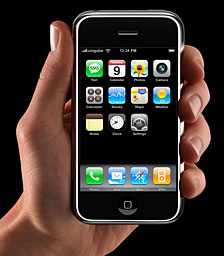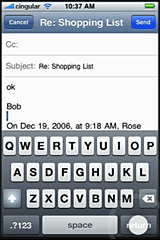Mac Musings
Why the iPhone Will Succeed Despite the Pundits
Daniel Knight - 2007.01.11
I'm a technologist. I love computers, new technology, clever hacks. And I love the new iPhone, even though I'm nowhere near Macworld Expo and won't see one until Cingular (soon to be rebranded as AT&T) has them in June.
There are a lot of technologists on the Internet. We love writing about hardware, operating systems, new peripherals, and other gadgets.
A lot of technology pundits are calling Apple's iPhone an overpriced gadget and don't believe it will sell well. I think that's nonsense.
Track Record
A lot of us thought the Macintosh was a stupid little toy compared to our command line PCs and 4-color CGA monitors. With that tiny black-and-white screen (not even shades of gray), a mouse, and a graphical user interface (GUI), it had to be a toy for the rich.
It ended up defining the entire computer industry. Even Linux, perhaps the geekiest operating system out there, is normally used with a GUI.
A lot of us wondered what Apple was thinking when it released the iPod in October 2001. It was neat, but it seemed to have a very limited market. The original 5 GB iPod only worked with Macs with FireWire, and it retailed for US$399. For a music player? A lot of us couldn't fathom it.
The rest is history. The iPod has become the leading portable music platform and the leading portable video platform.
When Apple introduced the iPod mini in January 1984, a lot of us thought it was ridiculously overpriced. It had less capacity than the full-sized iPod and absolutely failed any cost-per-megabyte analysis.
But the world embraced the smaller iPod because of its size, not because of its value. The iPod mini paved the way for the iPod nano - and by the time it was released, nobody questioned that it would succeed.
The iPhone
Apple's strategy isn't being first to market or building me-too products. Apple's strategy is to observe the market, see what it can do to offer a better product, and create the best items on the market. That's true whether you're looking at the best tiny desktop computer (the Mac mini), the best desktop computer with a built-in display (the iMac), the best workhorse computer (the Mac Pro), the best notebooks (such as the MacBook, 15" MacBook Pro, and 17" MacBook Pro), or the best digital music players (the iPod line).
Apple doesn't create the least expensive products on the market - nor the most expensive. Apple doesn't make cheap stuff, nor is their equipment overpriced. Considering the hardware design and user interface, Apple products offer great value while avoiding the low end of the market and keeping Apple profitable.
 The
iPhone follows in that tradition. It's not cheap. It's expensive.
It's new. And it's brilliant. It can replace a cell phone, digital
camera (at least for snapshots), iPod, and PDA. But it goes beyond
that.
The
iPhone follows in that tradition. It's not cheap. It's expensive.
It's new. And it's brilliant. It can replace a cell phone, digital
camera (at least for snapshots), iPod, and PDA. But it goes beyond
that.
The iPhone will fully integrate with your Address Book and iCal. It will let your access the Web and Google Maps using a WiFi connection or your Cingular service. It has Bluetooth to sync to your Mac or PC and work with wireless earpieces and headphones.
But it goes well beyond that. Apple has looked at the market and determined what people want. Do you want random access to voicemail? The iPhone introduces it to the market. Do you want keyboard input and the ability to enter phone numbers from a regular keypad? The iPhone's soft interface lets you do it. Do you want iTunes on your phone without the limitations of the ROKR and KRZR?
I liked my Newton and I like my Palm, but styluses sometimes disappear. I'm looking forward to seeing how well finger input works. On top of that, my handwriting isn't especially compatible with either of my PDAs, so having an onscreen keyboard could be a much faster way to enter data.
 I wonder
if you'll be able to turn the iPhone sideways to have a larger
keyboard....
I wonder
if you'll be able to turn the iPhone sideways to have a larger
keyboard....
The iPhone is also the first "true" video iPod. No move viewing TV and widescreen movies on a tiny screen - the iPhone's 3.5" 320 x 240 display is far better for video.
One key concept is that the iPhone as a PDA is more functional than other PDAs. And as a video iPod, it's more functional than any existing iPod. And as a cell phone, it's more functional than any "smart phone" on the market.
More value, more useful features, and easier access set the iPhone apart from anything else on the market.
As I wrote two months ago: "Apple isn't going to enter the market with a low-end cell phone. As they did with the iPod, they'll start at the top of the market. Maybe something to compete with the Treo 650, Blackberry, and Windows Mobile 'smart' phones on the market."
Apple had done that, and while prices are bound to come down and features improve (expect double the flash memory within a year, and I'd love to see an iPhone with a hard drive), Apple will sell a lot of iPhones at the announced US$499 (for 4 GB) and $599 (8 GB) prices.
Apple will turn a nice profit, develop incredible mind share, and eventually expand the iPhone line with less costly models and higher-end ones. Just like they did with the Mac. Just like they did with the iPod.
I've learned better than to question the wisdom of Steve Jobs when it comes to introducing innovative new Apple products.
Further Reading
- Thinking Through the iPhone: This Could Work, 2005.06.24
- ROKR iTunes Phone Definitely Not an Apple Product, 2005.09.14
- What Should We Expect in a Video iPod?, 2005.10.05
- The High-end iPhone: How Apple Could Grow a New Market, 2006.11.15
- Apple Inc. Intros iPhone and Apple TV, 2007.01.10